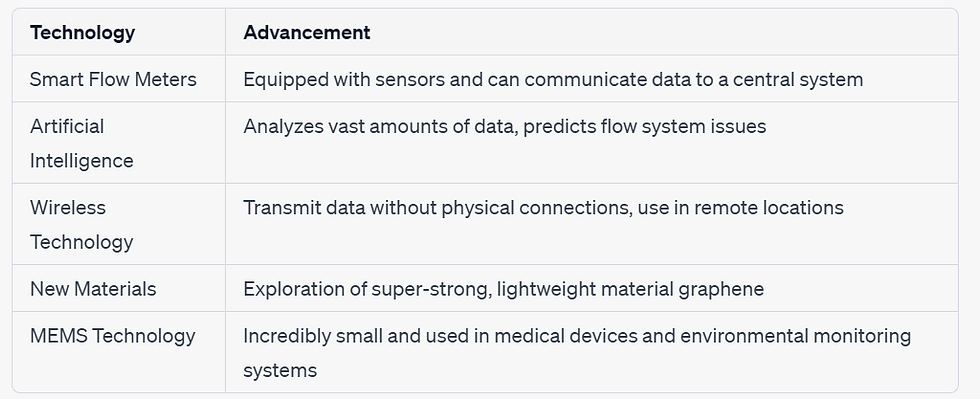What’s Next? Future Developments in Flow Meter Technology
- ADMIN

- May 3, 2023
- 2 min read
Flow meters have come a long way since their invention in the early 20th century, and they continue to evolve at an incredible pace. In recent years, new technologies have emerged, and existing ones have been refined, resulting in flow meters that are more accurate, efficient, and reliable than ever before. However, the future of flow meter technology promises even more exciting innovations and advancements.

One of the most significant developments in flow meter technology is the emergence of smart flow meters. These devices are equipped with sensors that can detect changes in flow rate and other parameters, and they can communicate this information to a central monitoring system. With the rise of the Internet of Things (IoT), smart flow meters are becoming increasingly popular in a wide range of industries, from oil and gas to water treatment.
Artificial intelligence (AI) is another area where flow meter technology is poised to make significant strides. With the ability to analyze vast amounts of data and make predictions based on that data, AI-powered flow meters have the potential to revolutionize the way we measure flow. For example, they could help identify patterns that indicate a problem with the flow system before it becomes a significant issue, allowing for preventative maintenance and minimizing downtime.
Wireless technology is also set to transform flow meter technology. Wireless flow meters can transmit data to a central system without the need for physical connections, which makes installation and maintenance much more straightforward. Additionally, wireless flow meters can be used in remote locations where running physical cables would be impractical or impossible.

Another area where flow meter technology is expected to advance is in the use of new materials. For example, researchers are exploring the use of graphene, a super-strong, lightweight material, in flow meters. Graphene has the potential to improve the accuracy and efficiency of flow meters while also reducing their size and weight. Lastly, advancements in micro-electromechanical systems (MEMS) technology are also expected to have a significant impact on flow meter development. MEMS-based flow meters are incredibly small and can be used in a wide range of applications, including medical devices and environmental monitoring systems. In conclusion, the future of flow meter technology is bright, with a range of exciting developments on the horizon. Smart flow meters, artificial intelligence, wireless technology, new materials, and MEMS technology are all expected to play a significant role in the next generation of flow meters. As these technologies continue to evolve, flow meters will become even more accurate, efficient, and reliable, allowing for better monitoring of flow systems and improved decision-making. The future of flow meter technology is undoubtedly an exciting one, and we can't wait to see what innovations the next decade will bring. Table: Future Developments in Flow Meter Technolog




Comments